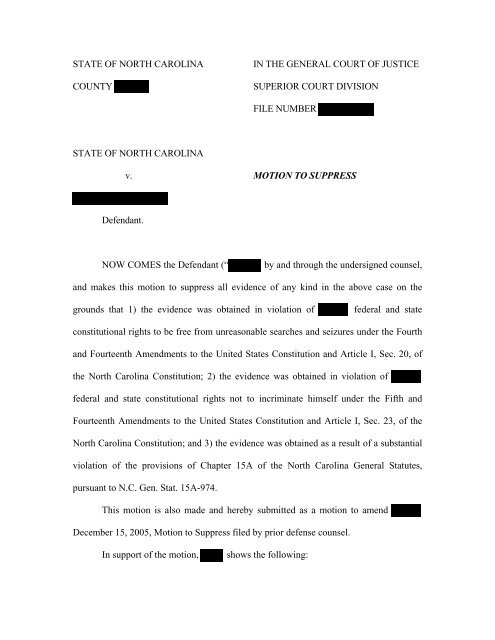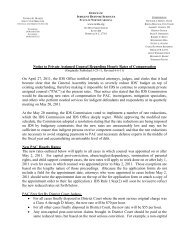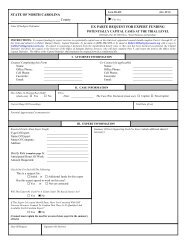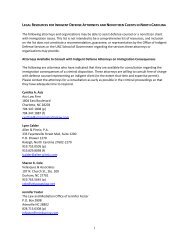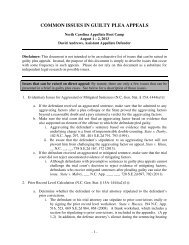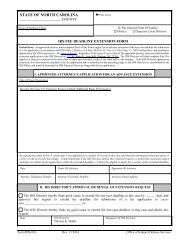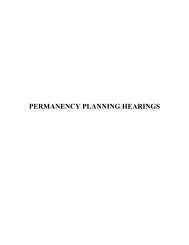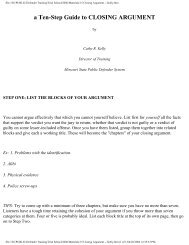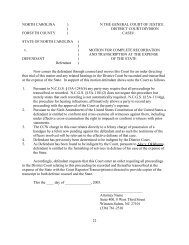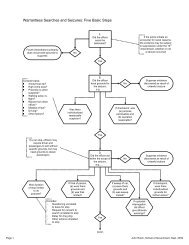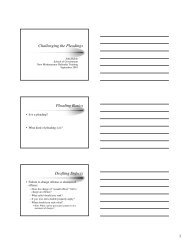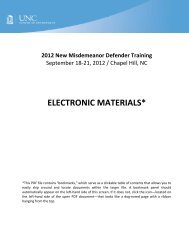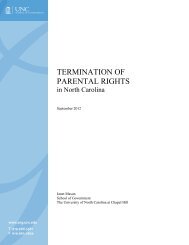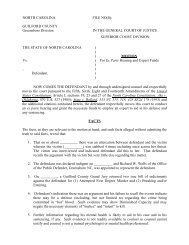Motion to Suppress Evidence Seized Pursuant to Warrantless ...
Motion to Suppress Evidence Seized Pursuant to Warrantless ...
Motion to Suppress Evidence Seized Pursuant to Warrantless ...
- No tags were found...
You also want an ePaper? Increase the reach of your titles
YUMPU automatically turns print PDFs into web optimized ePapers that Google loves.
STATE OF NORTH CAROLINACOUNTYIN THE GENERAL COURT OF JUSTICESUPERIOR COURT DIVISIONFILE NUMBERSTATE OF NORTH CAROLINAv. MOTION TO SUPPRESSDefendant.NOW COMES the Defendant (“ by and through the undersigned counsel,and makes this motion <strong>to</strong> suppress all evidence of any kind in the above case on thegrounds that 1) the evidence was obtained in violation offederal and stateconstitutional rights <strong>to</strong> be free from unreasonable searches and seizures under the Fourthand Fourteenth Amendments <strong>to</strong> the United States Constitution and Article I, Sec. 20, ofthe North Carolina Constitution; 2) the evidence was obtained in violation offederal and state constitutional rights not <strong>to</strong> incriminate himself under the Fifth andFourteenth Amendments <strong>to</strong> the United States Constitution and Article I, Sec. 23, of theNorth Carolina Constitution; and 3) the evidence was obtained as a result of a substantialviolation of the provisions of Chapter 15A of the North Carolina General Statutes,pursuant <strong>to</strong> N.C. Gen. Stat. 15A-974.This motion is also made and hereby submitted as a motion <strong>to</strong> amendDecember 15, 2005, <strong>Motion</strong> <strong>to</strong> <strong>Suppress</strong> filed by prior defense counsel.In support of the motion,shows the following:
4. In the present case, the officers entered private residence withouta search warrant and without an arrest warrant. The State’s discovery materials indicatethat they had received information from a confidential informant aboutsellingdrugs as early as November 5, 2003, and that they received additional information aboutfrom the informant on other dates. Nevertheless, despite the information compiledby the informant and despite the passage of fifteen days from November 5 <strong>to</strong> November20, the officers did not take the time <strong>to</strong> get a search warrant. Instead, they chose <strong>to</strong> enterresidence without a search warrant on November 20.5. At the time they entered, the officers had no justification <strong>to</strong> engage in awarrantless search.did not consent <strong>to</strong> their entry; he was grabbed through thefront door and placed in handcuffs by Officer before even knew thatOfficer was an officer. was then taken in<strong>to</strong> the house in handcuffs byOfficerThese facts do not constitute the giving of consent.6. The officers’ Incident Report supports the contention that did notgive consent <strong>to</strong> the entry of the officers in<strong>to</strong> his private residence. A copy of the report isattached here<strong>to</strong> as Exhibit B. Under the heading of “how attacked or committed,” theofficers wrote “suspects engaged in controlled substance violation.” For the question as<strong>to</strong> whether it was “forcible,” the officers marked “yes.” For the question regarding“weapon / <strong>to</strong>ols,” the officers entered “physical.” Neither nor physicallyresisted the officers on the night of their entry in<strong>to</strong> the apartment. They were unable <strong>to</strong>do so, because they were immediately placed in handcuffs. The only reason the officerscould have put “forcible” and “physical” on the Incident Report is because the officersthemselves acted in a forcible and physical manner <strong>to</strong> handcuff and and3
9. In addition, no other justifications for a warrantless search were present.For example, it cannot be argued that the officers were arrestingand that theirunlawful intrusion in<strong>to</strong> the residence and/or the additional search of the residenceconstituted a search incident <strong>to</strong> arrest. A search of a residence incident <strong>to</strong> an arrest in theresidence is a “protective sweep,” and it “must be limited <strong>to</strong> a cursory inspection ofplaces where a person may hide and last no longer than is necessary <strong>to</strong> dispel thereasonable suspicion of danger.” State v. Bullin, 150 N.C. App. 631, 640 (2002) (citationomitted). The search ofresidence by three officers and a drug dog was hardly“cursory,” and it included areas such as a dresser drawer, which were plainly <strong>to</strong>o smallfor a person <strong>to</strong> hide. It went far beyond a protective sweep.10. The search also cannot be justified under the “plain view” principles. TheState’s discovery materials contain no indication that the officers saw incriminatingevidence in plain view whenfirst opened the door in response <strong>to</strong> the knock ofOfficerEven if the State made that contention, it would fail. Our courts haveheld that “plain view of objects inside a house will furnish probable cause but will not,without exigent circumstances, authorize entry <strong>to</strong> seize without a warrant.” State v.Nance, 149 N.C. App. 734, 742 (2002) (emphasis added).11. To the extent that the State attempts <strong>to</strong> justify the search based on the plainview of contraband seen by the officers after they enteredresidence, thisargument also fails. The first requirement of the plain view doctrine is that “the initialintrusion which brings the evidence in<strong>to</strong> plain view must be lawful.” State v. Weakley, ---N.C. App. ---, 627 S.E. 2d 315, 319 (2006). As shown above, the officers’ initial5
intrusion in<strong>to</strong>residence was not lawful; as a result, the evidence they saw in plainview after the unlawful entry is inadmissible.12. Finally, the search cannot be justified as an “exigent circumstances”search. A search based upon exigent, or emergency, circumstances must be “strictlycircumscribed by the exigencies which justify its initiation.” Georgia v. Randolph, ---U.S. ---, 126 S. Ct. 1515, 1523 n.3 (2006) (citation omitted). “A generalized interest inexpedient law enforcement cannot, without more, justify a warrantless search.” Id. at1524 n.5. Examples of exigent circumstances include hot pursuit of a fleeing suspect andpreventing imminent harm <strong>to</strong> a law enforcement officer. Id. at 1524 n.6.13. The State may argue that the odor of marijuana detected by the officersfrom outsideresidence indicated that evidence was being destroyed and thusjustified an exigent circumstance warrantless search. In light of decisions from theUnited States Supreme Court and the North Carolina appellate courts, however, theargument must be rejected. An odor of marijuana reveals nothing more than personalconsumption of marijuana, which is a minor class 3 misdemeanor offense under NorthCarolina law. The destruction of evidence of a minor offense is not a sufficient exigentcircumstance for the warrantless search of a private residence. Because of the“presumption of unreasonableness that attaches <strong>to</strong> all warrantless home entries,” theUnited States Supreme Court has declared that[w]hen the government's interest is only <strong>to</strong> arrest for a minor offense, thatpresumption of unreasonableness is difficult <strong>to</strong> rebut, and the governmentusually should be allowed <strong>to</strong> make such arrests only with a warrant issuedupon probable cause by a neutral and detached magistrate.6
Welsh v. Wisconsin, 466 U.S. 740, 750 (1984). Cases from South Dakota, Idaho. Indiana,Nebraska, New Mexico, North Dakota, Washing<strong>to</strong>n, and Ohio therefore hold that theodor of burning marijuana is not an exigent circumstance justifying a warrantless search.Many other courts hold that the smell of burning marijuana does notevince a sufficiently grave offense <strong>to</strong> justify entering a residence without awarrant. These courts rely on the distinction between minor and seriousoffenses made by the United States Supreme Court in Welsh v. Wisconsin,466 U.S. 740, 104 S. Ct. 2091, 80 L. Ed. 2d 732 (1984). See State v. Curl,125 Idaho 224, 869 P.2d 224 (Idaho 1993), cert. denied, 510 U.S. 1191,114 S. Ct. 1293, 127 L. Ed. 2d 646 (1994); Haley v. State, 696 N.E.2d 98(IndCtApp 1998); State v. Beeken, 7 Neb. Ct. App. 438, 585 N.W.2d 865,872 (Neb 1998) (dictum); State v. Wagoner, 1998 NMCA 124, 126 N.M.9, 966 P.2d 176 (NM CtApp), cert. denied, 964 P.2d 818 (NM 1998);State v. Ackerman, 499 N.W.2d 882 (ND 1993); State v. Robinson, 103Ohio App. 3d 490, 659 N.E.2d 1292 (OhioApp 1995); State v. Ramirez, 49Wn. App. 814, 746 P.2d 344 (WashApp 1987).South Dakota v. Hess, 680 N.W.2d 314 (2004).14. The undersigned has not found any North Carolina cases applying Welsh inthe context of an odor of marijuana, but two similar North Carolina cases point <strong>to</strong> thesame result. The first is State v. Robinson, 148 N.C. App. 422 (2002). In Robinson,the officers had acquired information from an anonymous informant anddecided <strong>to</strong> investigate further. Upon investigation, the officerscorroborated some of the information provided by the informant. Theofficers attempted <strong>to</strong> gain consent <strong>to</strong> search Defendant's house, but weredenied. While attempting <strong>to</strong> gain consent, the officers discovered furtherevidence corroborating the informant's tip. The officers then entered thehome <strong>to</strong> secure it and any evidence it might contain, and then went <strong>to</strong>apply for a search warrant. In the search warrant application, the affiantreferenced as grounds for probable cause (1) the informant's tip, (2)Defendant's refusal <strong>to</strong> consent <strong>to</strong> a search of the house, and (3) and thecorroborating evidence, including the strong odor of marijuana, obtainedwhile legally on Defendant's property attempting <strong>to</strong> gain consent <strong>to</strong> search.Robinson, 148 N.C. App. at 430 (emphasis added). The second North Carolina case isState v. Ford, 71 N.C. App. 748, 752 (1984), in which the court noted that “the detectionof marijuana odors by a surveillance officer . . . constitute[d] adequate evidence from7
the Constitution of the State of North Carolina.” N.C. Gen. Stat. 15A-974. “OurSupreme Court has held that under the exclusionary rule, ‘[w]hen evidence is obtained asthe result of illegal police conduct, not only should that evidence be suppressed, but allevidence that is the 'fruit' of that unlawful conduct should be suppressed.’” State v.Battle, 136 N.C. App. 781, 783 (2000) (citation omitted).FIFTH AMENDMENT ANALYSIS17. In addition <strong>to</strong> the Fourth Amendment violations discussed above, the officersalso violatedFifth Amendment right not <strong>to</strong> incriminate himself by engaging incus<strong>to</strong>dial interrogation without first advising of his Miranda rights. was inhandcuffs throughout his interaction with law enforcement on the night in question. Hisresidence was invaded by three officers, who also brought a drug dog. Given the <strong>to</strong>talityof the circumstances, “a reasonable person in the defendant’s position would believe thathe was under arrest or the functional equivalent of arrest.” State v. Benjamin, 124 N.C.App. 734, 738 (1996).was in “cus<strong>to</strong>dy” for the purposes of the Fifth AmendmentMiranda analysis. In addition, he was questioned by the officers concerning variousissues while in cus<strong>to</strong>dy, including the presence of drugs and drug-related contraband inthe residence.18. As a result, was subjected <strong>to</strong> “cus<strong>to</strong>dial interrogation,” and he shouldhave first been advised of his Miranda rights. “[N]o evidence obtained from a defendantthrough cus<strong>to</strong>dial interrogation may be used against that defendant at trial, unless theinterrogation was preceded by (1) the appropriate warnings of the rights <strong>to</strong> remain silentand <strong>to</strong> have an at<strong>to</strong>rney present and (2) a voluntary and intelligent waiver of those rights.”9
State v. Jackson, 165 N.C. App. 763, 769 (2004).was not advised of his Mirandarights until 7:46 p.m. on the night of his arrest, after he had already been removed fromhis residence and taken <strong>to</strong> the police station. As shown by the Incident Report attachedas Exhibit B, the officers enteredapartment at 5:00 p.m. They kept him inhandcuffs and subjected him <strong>to</strong> cus<strong>to</strong>dial interrogation from 5:00 p.m. until 7:46 p.m.without giving him the required Miranda warnings. All ofstatements <strong>to</strong> theofficers concerning drugs and drug paraphernalia must be suppressed. The statementswere taken in violation of his Miranda rights and therefore in violation of his federal andstate constitutional rights not <strong>to</strong> incriminate himself under the Fifth and FourteenthAmendments <strong>to</strong> the United States Constitution and Article I, Sec. 23, of the NorthCarolina Constitution.19. In addition <strong>to</strong> suppressing the statements themselves, the court should alsosuppress the drugs and drug paraphernalia that were found as a result ofstatements, on the grounds that they were the “fruit of the poisonous tree.” See Wong Sunv. United States, 371 U.S. 471 (1963). As noted above, the court must exclude allevidence that is obtained as the “fruit” of a constitutional violation.also contendsthat his subsequent written statement at 7:46 p.m. at the Greenville Police Departmentmust be suppressed, because it <strong>to</strong>o was tainted by the earlier violation of his Mirandarights. Having already been questioned and given information <strong>to</strong> the officers at hisresidence in the absence of any Miranda warnings, a reasonable person inposition would have believed it was futile thereafter <strong>to</strong> invoke his Miranda rights andrefuse <strong>to</strong> give the written statement.10
WHEREFORE, the Defendant prays the court <strong>to</strong> grant this motion for the reasonsstated above and <strong>to</strong> suppress any and all evidence seized in his case on November 20,2003.This the ________ day of __________, 20___.LAW OFFICES OF KEITH A. WILLIAMS, P.A.By:________________________________________KEITH A. WILLIAMS321 South Evans Street, Suite 103P.O. Box 1965Greenville, North Carolina 27835Tel: 252 / 931-9362Fax: 252 / 830-5155N.C. State Bar Number 1933311
EXHIBIT A: AFFIDAVIT OF13
STATE OF NORTH CAROLINACOUNTYAFFIDAVIT OFNOW COMES the undersigned affiant, (“ whodoes state the following under oath:1. He is over the age of eighteen years and under no legal disability. Thematters stated in this affidavit are based upon his personal knowledge, unless expresslystated <strong>to</strong> be based upon his information and belief.2. On the afternoon of November 20, 2003, he was in his residence at 710Pat<strong>to</strong>n Circle, Apartment 17, Greenville, North Carolina. The residence was rented <strong>to</strong>and he was the lawful occupant of the residence. Also present was his thengirlfriend(and now wife),3. Someone knocked at the front door of the residence at approximately 5:30p.m. opened the door and saw a black male in street clothes standing there. Theperson did not identify himself; he said only that “Josh” had <strong>to</strong>ld him that he could getsome “smoke” from4. said that he had no idea what the black male was talking about, theblack male said that it sure did smell like had something. <strong>to</strong>ld the blackmale again that had no idea what the black male was talking about, andbegan <strong>to</strong> shut the door. At that point, the black male grabbed arm and pulled himoutside the door and kept hand behind his back. He then placed handcuffs on5. The black male then showed a badge <strong>to</strong> and identified himself as apolice officer. Shortly thereafter, he was joined by a black female officer. The blackfemale officer was Rose and the black male officer was V. bothofficers of the Greenville, North Carolina, Police Department. Officer called<strong>to</strong> come outside the apartment, and when she did, Officer handcuffedher.6. and were taken back in<strong>to</strong> the apartment in handcuffs by theofficers. The officers asked whether anyone else was present in the residence, andadvised them that no one else was present.7. The officers began looking around in the living room of the residencewhen Officer noticed a postal scale on the table. Officer <strong>to</strong>ld thatthe scale was enough <strong>to</strong> allow the officers <strong>to</strong> search the apartment. At no point did14
Officer or Officer indicate that they had either a search warrant for theresidence or an arrest warrant for either or8. Officer asked whether there was anything in theapartment that he would like <strong>to</strong> tell the officers about before the drug dog arrived.advised that he had marijuana in the second drawer of his dresser in the bedroom. Healso advised that he had a pipe in his left pants pocket as well as a two-gram bag ofmarijuana in the coffee table drawer and approximately a gram of marijuana in amedicine bottle on <strong>to</strong>p of the table.9. The officers advised that they were going <strong>to</strong> wait for the drug dog <strong>to</strong>arrive before going in<strong>to</strong> the bedroom <strong>to</strong> get the marijuana. While waiting for the dog,Officer got a plastic bag from the kitchen and put the pipe, medicine bottle,scales, and the small bag of marijuana in it.10. When the dog arrived at the residence, and were moved <strong>to</strong>the kitchen and joined by a white male officer. The dog was used <strong>to</strong> search the residence,and the drug dog officer advised that the dog had shown interest all around the dresser inthe bedroom. The dog was also used <strong>to</strong> search the kitchen.11. The dog was then taken out of the residence, and Officer <strong>to</strong>okthe two bags of marijuana from the dresser drawer in the bedroom and put them with theother items in the plastic bag.12. The officers let and sit on a small couch in the living roomwhile the officers searched a second, larger couch. In the process of searching the secondcouch, Officer found a rolled-up sandwich bag, and Officer said that itwas cocaine.13. was extremely surprised <strong>to</strong> see the cocaine, and he became visiblyupset. Officer <strong>to</strong>ld him that his bond was already $50,000.00 and that if kep<strong>to</strong>n whining like “a little bitch,” it would be $100,000.00. Bond was later set by themagistrate at $250,000.00.14. Officer and Officer went in<strong>to</strong> the kitchen <strong>to</strong> the clotheswasher and dryer. They came back with a small brown bag containing another rolled-upsandwich bag, and they said that it had more cocaine in it. was again extremelysurprised <strong>to</strong> see the cocaine and again became hysterical. During this time, the drug dogofficer was standing near the front door (without the dog) and saying that if helpedOfficer she would help him.15. The drug dog officer left, and Officer advised that if hegave her some information, it would help cause. <strong>to</strong>ld her thathad supplied him with the marijuana earlier in the day and that he must have been thesource of the cocaine. also <strong>to</strong>ld Officer thathad been in the residence earlier that day and that was a marijuana15
dealer from Farmville. also <strong>to</strong>ld her a person by the name of living atwas a marijuana dealer.16. Officer asked if he knew any cocaine dealers, andsaid that he did not because he did not associate himself around cocaine at all.17. and were in handcuffs at all times in the apartment fromwhen it is first noted above that they were placed in handcuffs. The handcuffs were notremoved at any time while they were in the residence.18. None of the law enforcement officers advised of his Miranda rightswhile in the residence. That is, none of the officers advised him that he had the right <strong>to</strong>remain silent, that any statements he made could be used against him in court, that he hadthe right <strong>to</strong> have a lawyer present, and that he had the right <strong>to</strong> a court-appointed lawyer ifhe was not able hire his own.Further the affiant sayeth naught.__________________________________AffiantSWORN TO AND SUBSCRIBED BEFORE METHIS THE ________ DAY OF MAY, 2006._______________________________________NOTARY PUBLICMy commission expires: ___________________16


